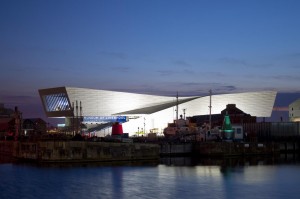Last time I posted, we had just opened up registration for our Massive Open Online Course (or ‘MOOC’). Back then, just a few months ago, we could only imagine how successful it would be. Over 11,000 people signed up for the six week course, and between them they have posted 43,500 comments in total. These are astounding figures and we are proud to have achieved such a high level of engagement. We’re delighted that our learners made our MOOC such an engaging learning experience – for us as well as, we hope, for all of our learners.
The purpose of undertaking the MOOC was to reach out to the museums community and the general public alike. It is rare that one has access to a platform with the potential to engage with so many people and showcase the teaching and research that goes on in our School. It was clear from the very outset that we had a huge mix of people undertaking the course; from museum professionals currently working in the sector to people who are keen visitors of museums who wanted to find out more.
Over the duration of the course, we presented lots of the research that is undertaken within the School and many case studies from our partners at National Museums Liverpool. We talked about how museums can connect emotionally with visitors, how museums can engage with new audiences, how a museum can be effective in promoting social justice, human rights and contributing towards the health and wellbeing of both individuals and communities.
Following the comments over the six weeks was fascinating. One thing was absolutely clear: Not everyone agreed with us. Sometimes the debate was fierce. Some commenters thought that museums should be dispassionate and not seek to elicit emotions amongst their visitors, other believed that there was no place for museums in promoting social justice, and others told us that it was not the role of the museum to become involved in the health and wellbeing agenda – museums were not social workers, we were told (on more than one occasion).
Interestingly, when specific case studies were presented, the comments were, generally speaking, incredibly positive. Of course the museum has a role in exploring the historic roots of slavery and racism and how this relates to the present day. Of course a museum can support dementia sufferers and their carers through offering opportunities for reminiscence. Of course a museum can help tell the 30 years story of HIV and AIDS and help reduce the stigma felt by people living with these conditions. Of course there will be times when museums will engage visitors on an emotional level when, for example, dealing with difficult (hi)stories.
It is my firm belief that museums have a positive role to play in society. They sit at the hearts of communities (local communities, national communities, communities of interest…) and have the opportunity to make a difference. For me, a museum talking about migration or racism or transpobia (all things we spoke about in the course) is not ‘box ticking’ or being ‘politically correct’ (yes, we were accused of that too). A museum that works in partnership with healthcare professionals to tackle health issues is not becoming a social worker. It is simply using its place at the heart of a community to support people to understand not just the issues of yesterday, but those of today too.
‘Museums Change Lives‘ says the UK’s Museums Association. I agree. But some people don’t. I haven’t read anything that has changed my mind. I imagine a lot of people who disagreed with us about one thing or another haven’t changed their minds either.
Whether agreeing or disagreeing, though, one thing is for sure. It was our commenters, and perhaps particularly those who posed a different point of view, that made our MOOC such an engaging experience that prompted so many comments and responses. Our thanks go out to everybody who signed up for our MOOC, and especially those who got involved with the lively and, at times, quite frank discussions. We loved the six week course, we loved reading your comments and hearing what you had to say. It was quite a roller-coaster at times, but we’d like to offer our huge thanks to everyone who came along for the ride.


 Subscribe to Robin Clarke's posts
Subscribe to Robin Clarke's posts
Loved the course. It is perhaps not so much about what we argued, or whether we changed our minds (or anyone else’s), as it is about what we have come away with – and for me that is a deeper and more layered appreciation of the context in which museums are finding and re-finding their way in the Twenty-first Century. Thank you.
Hi Andrew – glad you enjoyed the course and feel you have gained something from it – it’s great to have your feedback. I agree, ultimately it’s not about arguing or changing minds, but I think the debate meant that lots of people really engaged with the thoughts and ideas that were presented by us and other learners too!
glad to have signed up for this… at first, i told myself, what have i gotten into because as weeks passed, it gets more interesting and really time consuming. each participant has his/her own idea and we cannot avoid discussions and ‘arguments’. but putting all these ideas, conflicting or non-conflicting, we get to learn new things and it becomes constructive opening our eyes to the huge role museums play in people’s lives, not just enriching knowledge but their role in the society. i really hope there will be more MOOCs to come. thank you.
Thanks for your comment, Christian – glad you enjoyed the course. 🙂